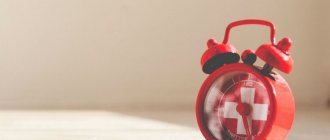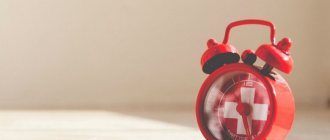Greetings, friends! Today, waking up early in the morning, I once again noted that I woke up literally a couple of minutes before the alarm went off. I don't always manage to wake up without an alarm clock. To do this, certain conditions must be met and the habit of getting up early must be developed. In this article I will talk about how to get up without an alarm clock at a time that you choose. This useful and fun skill can sometimes be compared to a superpower that anyone can master with the right approach.
How we sleep
To take control of your sleep and learn how to wake up without an alarm clock, you need to have at least a superficial understanding of how we sleep, wake up and why we need to sleep.
Sleep phases
A few words about the phases of sleep. There are two phases that replace each other on average 4-5 times throughout the night:
- REM sleep phase - during this phase, active brain activity occurs. A person in this stage of sleep can be identified by rapid eye movements. Waking up from the fast phase is often accompanied by colorful dreams, which I often want to see through.
- NREM sleep is a deeper sleep during which the entire body is relaxed and brain activity is reduced.
After stress, REM sleep takes longer, and after physical fatigue, on the contrary, slow-wave sleep predominates, and you sleep deeper. They also say about such a dream, “Sleeping like a dead man.” Age also has an impact - in childhood, REM sleep predominates, but over the years, the slow-wave sleep phase takes over.
It is advisable to wake up after entering the REM sleep phase, otherwise you will feel exhausted and sleep-deprived.
How we fall asleep and wake up
The hormone melatonin helps you fall asleep, acting like a sedative and suppressing your reaction to external stimuli. Melatonin is a circadian regulator. Every day, your biological clock adjusts your body to different types of activity, depending on the time of day. And at the time you usually go to bed, melatonin begins to be released.
By morning, the release of melatonin decreases, and this promotes awakening.
It is precisely because the body gets used to a certain regime that when flying to another time zone on the planet, you may experience problems with sleep and general fatigue.
What to do if your biological clock doesn't match your social clock?
Your own body can make it difficult for you to establish a new habit. If your social life and biorhythms are out of sync, no amount of advice will help.
Daria Lebedeva
somnologist
If your biological clock does not coincide with your social clock, you are a night owl. Ideally, you need to make sure that it is not you who adapt to life, but life that adapts to your chronotype. Keep this in mind when searching for a job. In many European countries, when hiring a person, they fill out a questionnaire to determine their chronotype, because the employer understands that this affects their ability to work.
For example, remote work is well suited for owls, when they can adjust their employment on their own or work online with countries from a different time zone.
How to get up without an alarm clock
Now let's move on to the practical part of this article and figure out how to get up without an alarm clock. Let's start with something simple.
Find out how many hours of sleep you need
An adult usually needs 7-9 hours, but there are exceptions.
You can record the time at which you go to bed and wake up for a week, and then calculate the arithmetic average.
Maintaining such statistics is greatly simplified by having a fitness bracelet with a sleep monitoring function. For example, I sleep on average a little over 7 hours, according to the schedule for the last month. In my case, if I want to wake up peacefully without an alarm at a certain time, it is enough to go to bed 7-8 hours before.
Stick to a Sleep Routine
In order for you to trust your biological clock, you need to tune it to work. To do this, it is enough to go to bed and wake up at the same time (if possible, of course), get enough sleep and follow the rules of healthy sleep:
- get rid of the habit of falling asleep with the TV on or with a smartphone in your hands;
- do not overeat before bed;
- do not drink coffee or alcohol before bed;
- make your bedroom comfortable, get rid of annoying sounds and light sources.
I wrote more about this in the article How to get rid of insomnia.
Stop relying only on your alarm clock
First, you need to get rid of the habit of setting the alarm clock for another 5 minutes. It happened to me that in this way I could delay waking up for more than an hour in a row, constantly waking up and snoozing the alarm. This habit prevents you from learning to get up without an alarm clock and does not help you sleep better and feel more energetic.
Secondly, try to wake up without an alarm clock. If you get up around the same time every day, try waking up yourself. If you maintain a sleep schedule and get enough sleep, you should develop the habit of sleeping through yourself. The body will already know that by this time it is time to reduce melatonin production.
Just in case, set an alarm clock, but 10-20 minutes later than usual, and on weekends you can practice without it.
Give yourself a mindset in the evening
Personally, I find this practice very fun and useful. You can choose your own time to wake up!
When I want to wake up earlier than usual, I set myself up in the evening. Closing my eyes, I imagine waking up at a certain time. I imagine my feelings, replay in my head the duration of sleep before waking up. In this way, I set the body to wake up at a certain time, mentally regulating the duration of the sleep phases. I don't know how it actually works, but it works! And the more detailed you imagine all this, the more likely and accurate the effect will be.
With practice, you can learn to wake up without an alarm, not only at the same time every day. You will understand how to get up without an alarm clock at absolutely any time you choose in the evening, and surprise yourself with your superpower to control the phases of sleep and awakening.
Daily rhythm of the day
Numerous experiments have proven that a week without sleep is the maximum threshold for the body's endurance. After 6–7 days, the brain ceases to distinguish fiction from reality, and behavior becomes unpredictable. Even a minimal loss of time for sleep has a negative impact on health, stress resistance and performance. This is due to the absolute dependence of the body on the circadian rhythm of the day, which lasts 24 hours. During this time, illumination, atmospheric humidity and temperature, the strength of the Earth's magnetic field and many other phenomena that affect the physical and emotional state change.
Our body is adapted to the rhythms of sleep and wakefulness. We wake up in the morning, fall asleep in the evening, and this happens throughout life. Sleep is classified as a wave-like process consisting of five cycles. They are updated every 1.5 hours. The first, second and last (5) phases of sleep are called light. It is comfortable to sleep at this time, since the body easily adjusts to wakefulness. During deep sleep phases (3 and 4), getting out of bed is much more difficult. Biorhythms are disrupted, and a person does not feel rested.
The quality of sleep is influenced by many factors. The most common causes of violations:
- night work;
- habit of sleeping late;
- large snacks before bedtime;
- bad habits;
- stress, anxiety.
You can adjust your daily routine and allocate enough hours for sleep, but it’s not always possible to get up early without an alarm clock. To do this, you need to learn how to independently adjust your biological clock. Every person has this ability, but few use it.
It is impossible to rebuild your sleep rhythm in one day, since the body needs time to adapt to a new schedule. It will take at least 2 weeks for waking up early without an alarm to become a daily habit.
Bottom line
The more often you rely on yourself, the easier it will be for you to wake up without an alarm clock at any time. Train your body, learn to program your sleep phases, and you will stop depending on the alarm clock.
Friends, do you manage to wake up without an alarm clock? Or do you like to transfer it for another 5 minutes several times, trying to “get enough sleep”? If you have other tips on how to wake up without an alarm and how to wake up early, please share them in the comments!
And don’t forget that you can subscribe to blog updates and receive announcements of new materials by email.
See you again! Yours Alexander Gorokhov
How to get up early: preparing the body
How to prepare the body for early awakenings in addition to the above methods. Strengthen the body. A body that is in good shape is easier to train for something. So here's what you need to do:
- Exercise. And regularly. It has been proven that even people suffering from insomnia can overcome their problem when they start devoting time to sports. at least 30-40 minutes three times a week for classes.
IMPORTANT: Aerobic exercise is especially preferable. This could be running, swimming, football or basketball.
- Organize your diet correctly . Whole grain cereals, fruits and vegetables, lean meat - all this should be present on the table in large quantities. Experts recommend enriching the menu with foods containing tryptophan - bananas, milk, nuts, eggs. The fact is that tryptophan helps the body fall asleep faster.
It is good to drink milk at night - in this case you will be able to get up earlier
- Eliminate foods that are harmful to quality sleep from your diet. So, food that includes processed grains, fats, and large amounts of sugar will only cause harm. It will be difficult for the stomach to digest such food - for this it will need to allocate more energy and time.
- Whatever the food, you should not eat it immediately before bed . It's better to eat a few hours before bedtime.
- It is good to drink a glass of water in the morning. Water removes harmful substances accumulated at night and helps you wake up faster.
- Coffee – it’s worth mentioning separately. It is commonly believed that this invigorating drink allows you to wake up faster. However, large daily amounts of coffee have been proven to blunt the functioning of natural regulators . Up to the complete cessation of their work. By the way, it should be remembered that caffeine is contained not only directly in the invigorating drink, but also in some others. And also in some medications.
IMPORTANT: Experts believe that a safe daily dose of caffeine is 500 mg in the morning or afternoon.
Your daily cup of coffee should be small - it won’t hurt to get up early
Place the alarm clock out of reach of your hand
It's best if you have to get up and walk around to turn it off - this way you won't be tempted to fall back into bed. Sleep scientists say that there is nothing worse than the habit of snoozing the alarm clock for 10-15 minutes. It turns out that the sound of the alarm clock pulls you out of sleep, you put it off for 10 minutes, fall back into sleep and the ringing again pushes you back at the moment when you plunge into a deep phase.
The habit of rescheduling your alarm several times means that when you finally find the strength to get out of bed, you feel completely overwhelmed. This will not happen if you get up immediately after the sound of your alarm wakes you up.
without-an-alarm-clock-9.jpg
4. Calculate the number of hours before your expected wake-up time . If possible, try to sleep in multiple 90-minute chunks; Sleep has cycles that repeat approximately every hour and a half (this time will vary from person to person). You can take advantage of this benefit by waking up during the period of “shallow sleep” (at the end of the cycle).
5. Visualize the time you wake up. When you are already lying in bed, think about the time when you want to wake up. Imagine a clock with this time on it, and imagine yourself waking up at this time. It can be helpful to say out loud to yourself, “I will wake up at (desired time).”
Although this may sound ridiculous, control experiments have shown that many people using this technique regularly wake up at a given time without any external wake-up stimuli. How the brain keeps track of the clock is not known.
Calculate your sleep norm
The first step is to figure out how much time you need to sleep (usually an adult needs 6 to 9 hours of sleep per day). To understand how many hours of sleep you need, you will have to experiment on yourself and draw conclusions. Sleep for different numbers of hours and write down your feelings in the morning and during the day: do you feel cheerful or sleepy, dizzy, etc. Sooner or later you will determine your norm and, based on it, you will be able to go to bed and get up on time.
© pixabay.com
without-an-alarm-clock-2.jpg
2. Set an alarm to wake up around this time every morning . Physiological processes in our body are regulated by the circadian rhythm, which is closely tied to the 24-hour day. By regularly waking up at the same time, you set up this rhythm.
Don't press the "nap" button! Research shows that this only leads to feelings of fatigue. Even if you didn’t fall asleep after pressing the button, your circadian rhythm is still disrupted. Don't deceive yourself!
Salute the sun
There is a scientific explanation for the effectiveness of this ritual of yogis, which dates back thousands of years. The fact is that our body reacts to sunlight in a certain way: the production of melatonin, the sleep hormone, decreases. It is this hormone that is to blame for the drowsiness and slight weakness that we feel immediately after waking up (and, by the way, it is problems with its production that most often lead to insomnia).
In other words, a few minutes in bright light will really help you shed the remaining sleep and switch completely to wakefulness mode. You don’t have to do yogic practices (although the ritual has its own beauty and does bring peace), just get out of bed and stand in front of a window with bright natural light for a couple of minutes.
First prototypes
But by the 17th and 18th centuries, the first household alarm clocks had already begun to appear. They were controlled by internal scales, which gave a signal at a predetermined time.
He left his family for her sake: Valdis Pelsha’s second wife gave him three children. Photo
Modern youth will never understand these moments from Soviet films
Just like getting ready for a date: how beavers wash themselves in the river (video)
At the beginning of the 19th century in Britain, wealthy families began to hire special people. They, armed with long sticks, continuously knocked on the window until the man woke up. Some used a special tube to shoot peas at their clients' windows.
Tips for waking up early
How I want to get up early, and at the same time easily, without violence against myself. Again, expert advice will come in handy.
- There must be motivation. If you don’t understand why you need to get up early, then it’s difficult for you to do it. You need to know exactly what waking up early will give you, what benefits you will get from this action. There must be awareness of the obvious benefits of waking up early.
- Learn to wake up without an alarm clock. Try not to turn on the alarm on a weekend or vacation, but use the power of thought to help you wake up as if you were going to work.
From personal experience. Before going to bed, on a large stone, with white paints, mentally draw the time when you need to get up. Imagine this vision for a minute. With daily practice, you will soon learn to do without an alarm clock.
- Never give yourself morning indulgences: “5 more minutes.” As soon as this thought comes to mind, immediately get up and go wash yourself. The terrible desire to fall asleep again will quickly disappear.
- Ventilate the room before going to bed, change into comfortable clothes.
- Don’t watch “scary” movies, don’t listen to upbeat music before bed, rather draw or do a mosaic. When you go to bed, turn off the TV and lights. You need to sleep in complete darkness.
- Have dinner 3 hours before bedtime and take soothing baths. When you lie down, think about something pleasant.
What time is it now?
For centuries, even just figuring out what time it was was a problem. They tried to solve it with the help of complex inventions.
The ancient Greeks and Egyptians developed sundials that measured time based on the movement of the sun.
Around 1500 BC, sand and water clocks were invented, which measured the passage of time by the movement of sand or water.
Associated with these early inventions are several rudimentary attempts to invent a device that would help one wake up on time in the morning. For example, in ancient China, nails were inserted into wax. As the wax melted, the nails fell onto the metal surface, causing the sleeper to wake up.
However, such inventions were still very approximate and conditional, and therefore unreliable. Therefore, until more precise mechanical inventions were created, people had to depend on their own internal clocks.
“Forgive”: how to answer a person if you don’t have the strength to forgive (and don’t take the sin on your soul)
Developing mindfulness: how to increase attractiveness according to science
Why did ancestors in the old days dream of good weather on Forgiveness Sunday?
Morning hydrotherapy
Showering helps you wake up and recharge, and if you do it right, a morning shower will wake you up much better than strong coffee.
The main principle: temperature change, but not shock. Start with a comfortable hot shower, and then play with the temperature, making the water a little cooler, then hotter. It is not necessary to torture yourself with a contrast shower; switching from hot water to warm, barely cool and hot again will do the job without an unpleasant temperature shock.
"Owls" and "Larks"
It is customary to divide all people into “larks” and “night owls”. These two sleep patterns are common to the entire population. The first to rise early, often at dawn. Their performance is best in the morning; it decreases in the afternoon. They feel comfortable going to bed no later than 10 p.m.
The second type prefers to sleep for a long time, it is difficult for them to wake up in the morning, and they get up closer to lunch. Such a person, even if he gets up early, will still remain sleepy, lethargic, and will want to rest. He will return to the working rhythm only in the afternoon. Lights out come after midnight.
Second way. Use your senses
1. Take advantage of lighting . The brain will react to the light and bring you out of the sleep state. Open your blinds or curtains to wake up to the sunrise. Retract them if you want to sleep longer. Position the bed so that it receives light at the right time - it may need to be moved from time to time as sunlight hits at different angles at different times of the year.
Remember that the sun rises in the east; in the Northern Hemisphere, a room with windows facing south will be better illuminated, and in the Southern Hemisphere – with windows facing north. Except if you want to wake up when the sun is already high, it is better that the windows in the room face east, then you can “catch” the sunrise.
If you need to wake up before sunrise, set a timer to turn on the lights in your room, which will be less stressful than an alarm.
2. Include sounds. Noise (such as an annoying car siren) will also jolt you out of your sleep state. Listen, what sounds can you hear around and when? The noise of trains, cars, animals, conversations of passers-by may well serve as a signal to wake up. You can take advantage of this by noting what wakes you up and when. We recommend leaving the windows open (weather permitting) to hear more sounds.
Despite the fact that formally they can also be considered alarm clocks, such sounds are felt completely differently. If this option doesn't suit you, you can try special alarm clocks that use music, light, or even the smell of bacon instead of an annoying call.
3. Set the appropriate temperature . The body is very sensitive to temperature during sleep. If you have a heating system with a timer, you can turn it off at night and set it to turn on an hour before your desired wake-up time. Provided you slept at a comfortable temperature at night, this will encourage you to wake up. You can also use temperature in combination with light - once the sunlight reaches the bed, it will warm you up.
You can choose a blanket that makes you comfortable to sleep at night (body temperature drops after midnight), but becomes too hot in the morning (body temperature rises towards the end of the sleep cycle, regardless of external influences).
The National Sleep Foundation has found that temperatures below 75 degrees Fahrenheit (23 degrees Celsius) are the most comfortable for sleep. But individual needs vary, and not all researchers agree on this indicator. You might like to sleep in a cool room. If it's cold, wrap yourself in a blanket.
4. Let a pleasant aroma wake you up! If you drink coffee regularly, the easiest way to use smell as a wake-up cue is to place the coffee maker in your bedroom (or as close to it as possible) and set a timer a couple of minutes before the time you want to wake up. Scent is generally not the most reliable option, so it's best used as a complement to another awakening method.
Is it worth changing your lifestyle?
It's good to give advice, but it's not easy to follow it. Every person has a question: how long does it take to learn to get up early?
It’s interesting to know how long it takes in practice to change your usual routine? Entrepreneur Zdravko Cvetic tried to learn how to get up early. After that, he published all the practical materials. The author admits that he spent almost 4 years just on developing and testing advice.
The author tried all his developments on himself. I broke down, experimented again, but still managed to get up early. The entrepreneur claims that “the game was worth the candle.”
In the modern world, for some reason, they have come to believe that early means getting up at 5 am. But getting up early isn't just about 5 am. The concept of “early” is determined by the presence of family, work, hobbies, what you do, social circle, frequency of travel and many other definitions.
If a person works in shifts, then after a night shift it is difficult to sleep for 2 hours and get up at 5 or 6 in the morning. But still, every person will be able to find the daily routine for themselves in order to get up early and feel good.
How can an owl learn to go to bed early?
If a person is an owl, then closer to night he becomes active and active. But the morning is a real problem for them. Can owls cheat their biorhythms? It’s possible, you just need to find a period to fall asleep on time. What time and how should owls go to bed?
Preparing for a night's rest.
- Before going to bed you will have to relax. Turn off the computer and TV about an hour before. It is recommended to go to bed at 21:00.
- Be sure to ventilate the bedroom and turn on quiet, relaxing music.
- You can go for a walk, walk at a slow pace for half an hour.
- A warm shower, a massage with lavender oil, a cup of mint tea with honey will help.
Relaxation technique
Direct your gaze to some object. Look at it for so long until its outline begins to blur. Remember a pleasant event from your life, imagine it again.
Wake up time
Set your alarm clock in the next room so you don't have to flinch at the sound of it in your ear. Change the melody whenever possible. In the evening, imagine drinking a cup of aromatic coffee in the morning.
Don’t lie in bed, forget about “five more minutes.” Take a contrast shower with the scents of pine oils or citruses. Rub your earlobes and palms. For owls, you need to have breakfast after getting dressed for work. Therefore, prepare your clothes for tomorrow in the evening. Loungewear will relax you and prevent you from becoming active.
Start imagining: you will come to work now, look through the papers, and so on. So plan your day in order. This will drive away drowsiness and infuse new strength for achievements.











